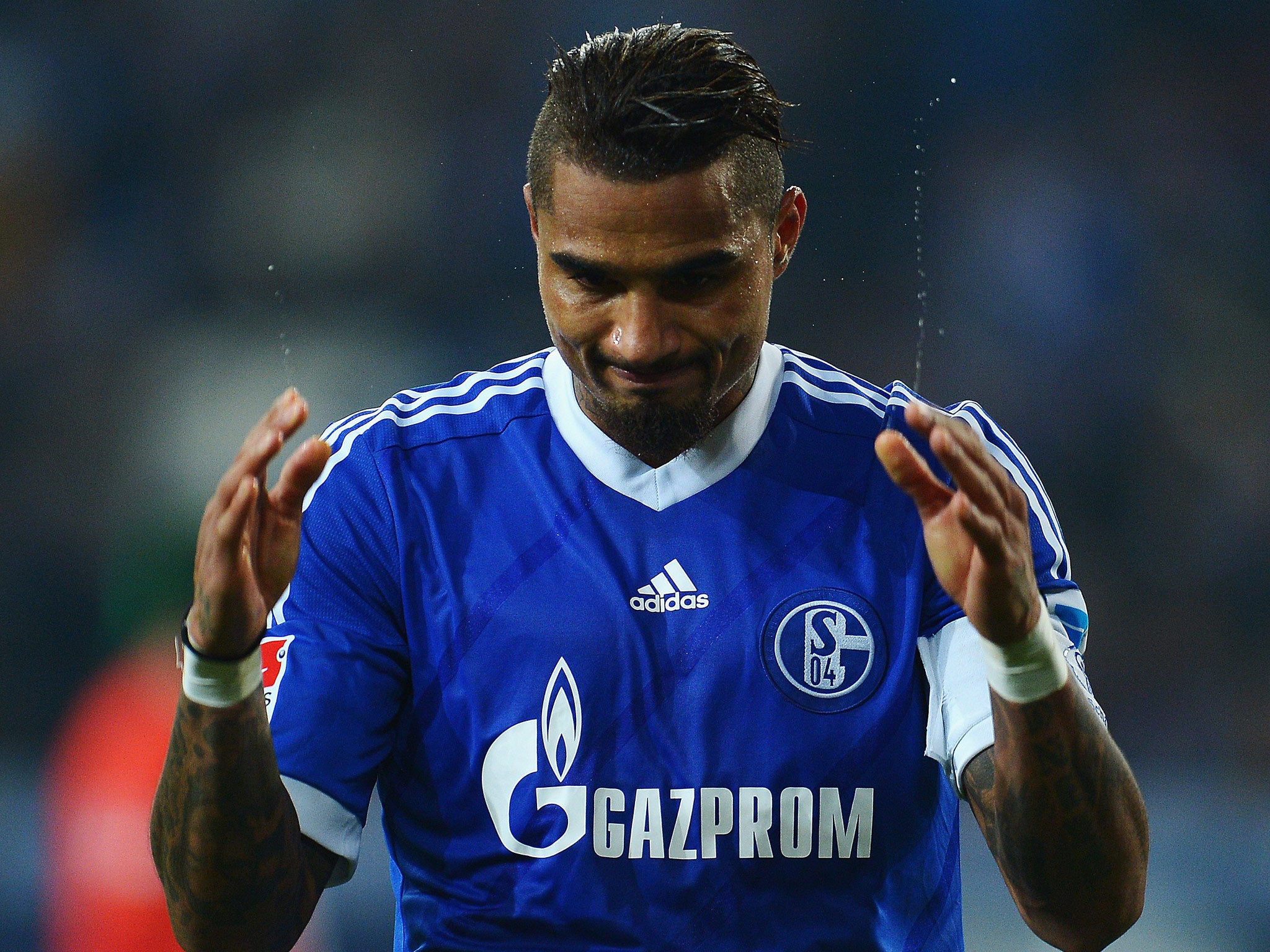Vladimir Putin, Gazprom and Schalke 04: How Russia sending troops to the Crimea is being felt in the Bundesliga
A reminder that sport and politics will never be entirely separate

It was the Belarusian Foreign Minister who this week became the latest in a long line of people to declare that “sport and politics must be kept separate”. He, like all those before him, was wrong.
Take Schalke 04. A proud worker's club from the Ruhr, with democratic, community traditions. A club where fans have a voice, and can still, to a certain extent, alter club policy, as they did last year over the controversial cooperation with online ticket marketplace Viagogo. It is also a club whose chairman, Clemens Tönnies, has a close relationship with the Russian president, Vladimir Putin. A club which receives 16 million Euros a year from Gazprom, the energy company owned by the Russian state.
It was a relationship which most had seen fit not to make too much of a fuss about. They were happy to "separate sport and politics". As events develop in the Crimea, one wonders for how much longer such an attitude can endure.
Some Schalke fans have acted in recent days. The fan publication "Schalke Unser" sent a letter to the board this week urging them to distance themselves from Putin.
"FC Schalke 04 is a club with democratic foundations, that holds freedom of opinion in high esteem," wrote Roman Kolbe, "We should not serve an autocrat".
The letter was a response to reports that Putin had invited the Schalke team to meet him, in a further victory for the separation of sport and politics. Shortly after the invitation was sent, he ordered soldiers to march into the Crimea.
That invitation still stands, even with Putin's hands tied up in the various machinations of the Crimea, the Ukraine and, dare we say it, Estonia. Schalke's general manager Horst Heldt explained at a press conference yesterday, however, that "we haven't yet made any travel plans".
Many Schalke supporters must be relieved. It would be humiliating indeed to see the likes of Julian Draxler, Klaas-Jan Huntelaar and the increasingly politically impressive Kevin-Prince Boateng smirking at Putin's biceps, while Tönnies scurried around looking for feet to kiss. But even without an official visit, Schalke's relationship to Putin, and the various pies in which he has fingers, remains strong.
How could it be anything else? Only in January, Tönnies declared that he would make the club debt free under his own watch. In the last two years alone, the meat production baron has overseen a reduction of Schalke's financial commitments by nearly €50 million. It remains, however, around €170 million in debt. Schalke need Gazprom.
And they have them - until 2017, as dictated by a recent contract extension. Schalke's already tough financial predicament - though also not helped by Felix Magath's transfer policies - would be a whole lot worse were it not for Tönnies' relationship with Putin.
Neither is said relationship something which Tönnies or the club seek to play down. Speaking to the Süddeutsche Zeitung, the club described its relationship with Gazprom as "credible, trusting and constructive".
Tönnies' gushing on the subject of Putin, meanwhile, could leave no one in any doubt that Schalke have managed to limit the relationship to Gazprom alone. In various interviews, Tönnies has claimed that, whenever he meets Putin, he brings the Russian president samples of his two main products: some meat and the latest Schalke shirt.
In an interview with the Cologne newspaper "Express" in 2012, Tönnies described Putin as "someone you can have fun with", adding that "he's a very good cook, and he even laughs sometimes." He went on to explain that "you cannot compare the democracies in Russia and Germany". Under Putin, he said "many things in Russia have developed positively".
Talking up Putin may have worked until now, but unrest is growing among the Schalke fans. "Schalke Unser"'s Roman Kolbe told The Independent that "among the fans, the feeling is decidedly against a meeting with Putin. I wouldn't be surprised if we see some banners (against Gazprom and Putin) in the stadium soon".
How successful such protests would be is another matter. The fact remains that the club is to a certain extent reliant on its Russian partnerships, and besides, a few thousand football fans are not going to bring down a major deal made by one of the biggest gas companies in the world.
But it would be an acceptance that, in this case, sport and politics remain absolutely intertwined. An acknowledgement that the co-operation with Gazprom and Putin is seen by many as an insult to Schalke's heritage and to football.
And it would have a significance outside of Gelsenkirchen. For Gazprom's influence in football is not limited to Schalke. We all watch the Champions League, and yet the only people to have voiced any significant criticism of its partnership with Gazprom are Greenpeace. Their demonstration at Schalke's Champions League fixture in Basel last autumn remains the only major one to have been carried out at a football match.
Perhaps a few Schalke fans will remember that, and fashion their own protest banners for tomorrow's game against Hoffenheim. Perhaps it won't herald major world change, but it will at least remind us that sport and politics are not, and never will be, entirely separate.
Subscribe to Independent Premium to bookmark this article
Want to bookmark your favourite articles and stories to read or reference later? Start your Independent Premium subscription today.

Join our commenting forum
Join thought-provoking conversations, follow other Independent readers and see their replies